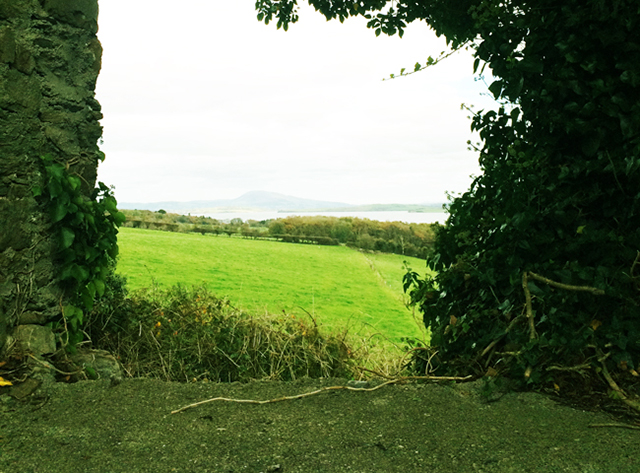Column: Finding solace in the magic of Ireland

We got a new long-term parking service at JFK — our old one went out of business — and hired a robot to give us directions for a 10 p.m. flight. In her stern, almost-pleasant voice, she gave us sensible directions until she slipped her moorings and went to Route #2, called “All the Way ’Round the Mulberry Bush.”
We toured, during rush hour, Garden City, Adelphi University and every street in Jamaica, directed to turn at every corner.
The parking service was a pitch-black lot, defined by a hurricane fence. As some guy hopped in and drove my car away I wondered: Just call the insurance agent now? The bus taking us to the terminal — the word has never been more apt — had the same lighting as the lot. None.
It turned out our terminal wasn’t our terminal. The website booking service had screwed it up — so the airline told us — and we rushed to take a train to the new one.
Then it began to get truly grim.
I’ve defended the Transportation Security Administration officers in the past. They do an essential, difficult job and are usually professional about it. But even pros can get spooked when thousands upon thousands of people are herded into a 1.5-mile series of switchback corrals dragging luggage and children.
The din grew as TSA and airport personnel were shouting at us to keep moving. A large, wild-eyed dog leaping to escape a leash held by an officer was among us in the corrals. Once through security, we had, for some reason, to go through the whole thing again. Bars on the concourses had muted TVs with images of college football or the president at a rally. Customers were staring, stunned.
The airline had no seat assignment for me, and they had overbooked the flight. It took awhile for airline personnel to sort it out that I had paid good money to ride on their plane.
Then, the Wizard of Oz effect — Dublin in the morning was in Technicolor after our long, dark night. For the next two weeks, it was as if someone had turned down the audio. Ireland was soft, hospitable and quiet.
I always forget how beautiful it is — and a certain Irish sense of conversation and humor. One of the first people I spoke to, a young man, asked how the flight had gone. “Kennedy was insane last night,” I said.
He took his time, his smile slowly growing: “My name is Kennedy. Brian Kennedy. But how did you know what I was up to last night?”
Ireland is a modern European country, with all the benefits and ills that defines, but there are so many opportunities to forget it. Near where we had once lived in County Clare, we had a simple, delicious evening meal in a quiet pub that was identical in atmosphere to decades ago. We sat near a farmer and his wife having their meal of fish and chips, he with a pint and she with a glass of wine, speaking softly with one another.
We noted how nothing has changed, except as we were leaving, we looked over and their weathered country faces were illuminated by their phones.
Longtime friends, and people we had just met, would wait a bit in conversation, but all finally got around to the same polite question: What’s going on over there? Meaning the U.S. There were no answers, really.
Irish political discourse is civil, there’s no name-calling, no preposterous claims. The press is respected. One interesting modern American effect, however, was seen in the campaign for their president while we were there. The office of president of Ireland is completely ceremonial. (Since Ireland is on a parliamentary system, without a president there is no head of state.) Ceremonial, but in no way meaningless or non-essential. The president represents the country abroad and has a powerful platform to express his/her views (there have been two women elected president).
This time around, poet and sociologist Michael D. Higgins, a revered figure in Ireland, was running for a second term. Several candidates challenged him, including a businessman, Peter Casey. Part of Casey’s campaign was to slander the Travelling community, a distinct ethnic group, known in less respectful times as Tinkers, who have been in Ireland since St. Patrick had his first pint. They suffer from bigotry and all that goes with it, including poverty and social ills.
When Casey said Travellers were basically a shiftless, lazy lot with a jumped-up sense of entitlement, most people were astonished and he was roundly condemned. But it worked, to an extent, because he separated himself from the pack. Nevertheless, Michael D. (as he is known) beat Casey by 33 percentage points.
At a country inn after dinner, a man asked me to explain America’s gun laws. I started to speak about the Second Amendment and the American frontier, when he interrupted me. “Assault weapons, mass shootings … It’s baffling to us.”
There was nothing, I realized, that I could say to him to explain.
I’m home. But part of me is on a hill looking down through trees at sunlight glinting on the waters of a lake in County Donegal. The only sounds are wind in the branches and, far away, the distant quarreling of crows.
The author is the editor of the Shelter Island Reporter. He can be reached at [email protected].









